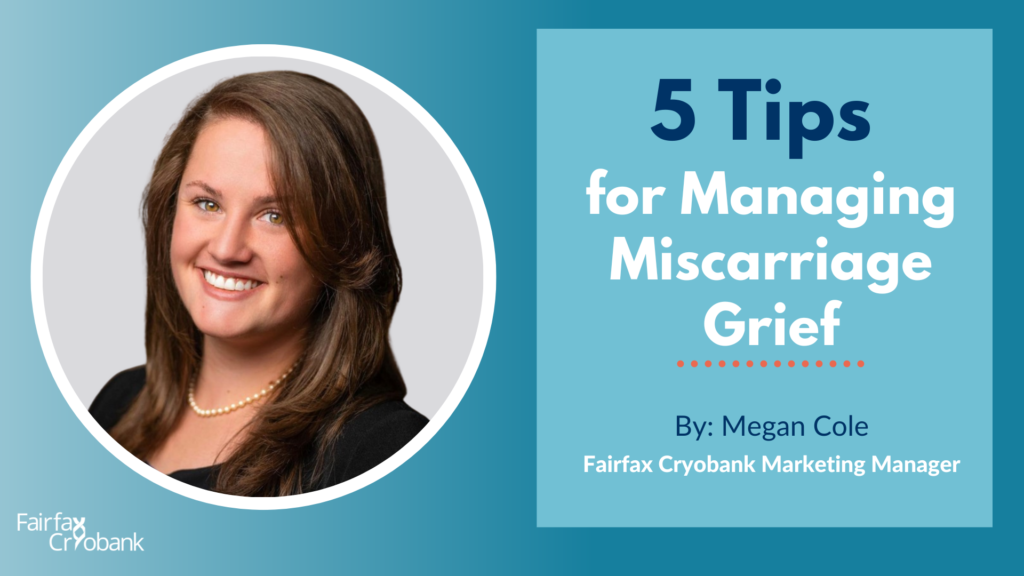5 Tips for Managing Miscarriage Grief

Written By: Megan Cole, Fairfax Cryobank Marketing Manager
*Disclaimer: This content is created to share the personal experience of the writer and inspire readers to heal on their own family-building paths. It is not meant to diagnose, treat, or give specific medical advice. Always consult with your health care provider about how to stay healthy and safe before, during, and after pregnancy, miscarriage, or pregnancy loss.
Loss is hard. The grief that comes after can be harder. Everybody’s experience is unique when it comes to miscarriage and pregnancy loss, but it can help to know that you are not alone. My miscarriage experience was 18 days long, from finding out I was miscarrying to actually “completing” it. After a failed round of medicine, followed by a D&C (dilation & curettage) procedure, the initial physical part was over.
Here’s a not-so-fun fact (but an important to one to know): Of known pregnancies, it’s estimated that 10-20% result in miscarriage. About 80% of them occur in the first trimester. As a sperm bank that serves clients going through so many unique family-building journeys, we know it’s an important topic to raise awareness about. We also wanted to provide some tips for navigating grief after miscarriage:
1. Seek Support
The first bit of advice is to seek support – with others that have shared similar experiences, your trusted medical professional, and your spouse or partner (if applicable). There are quite a few digital support resources available – from Facebook groups, to blogs and forums within apps you may already have (like Flo and Ovia). Connecting with others, reading their stories, and sharing your own story (if you choose to) are positive ways to help process the experience.
As you navigate this grief journey, it’s important to remember that spouses/partners feel the loss too. Since they didn’t have the same physical and hormonal experience with their bodies as you did, they process it differently. They may appear to get over it more quickly or say unintentionally insensitive things. It’s unrealistic to expect our partners to know exactly the right thing to do or say, or even grieve the same way we do. We can still accept support and love from those closest to us if we keep that in mind. For some of us who have experienced loss, it is the ONLY support we get. It’s a good idea to consider including them in your healing instead of pushing them away.
Be honest with your doctor about your mental and emotional health, too. In one study, 24% of women who experienced miscarriage showed moderate to severe anxiety symptoms in the month following. Also seek medical support and follow up with your doctor on any physical considerations like:
- Healing time
- When to begin exercising again
- Future exams
- Follow-up bloodwork
- When you can try to conceive again (if you are ready!)
- Any other concerns (PCOS), fertility questions, etc.)
2. Practice Self-Care & Leverage Exercise
It’s important to practice self-care during this healing time. We can get lost in the emotional sauce of the aftermath (I know I did.) and forget to get treat ourselves well. That can mean making sure to get enough sleep, hydrate properly, and fuel your body with nutritional meals to help along physical recovery. Self-care can also be:
- Enjoying a hot bubble bath
- Throwing yourself an at-home spa day (or going to a great spa)
- Treating yourself to a professional massage
- Reading a book, journaling, or doing any activity that bring you joy, comfort, etc.
- Doing nothing at all. Seriously, a good Netflix & binge-watch of a funny show can do wonders (*See my Don’t Watch recommendation at the end of this article.)
Once medically cleared by your doctor, exercise is also a great activity that can have a positive effect on both physical and mental health. This was and still is a huge part of my journey. While there are times when life happens and I don’t take a walk (or just don’t feel like it), I have felt a lot better when I do.

BONUS: Pairing the exercise with a cute dog who could pick up on when I was feeling down was incredibly comforting. We didn’t have to talk. I didn’t have to sit and stew alone with my emotions. We just walked. Then, we sat in the sun. With that, I could feel my body and soul slowly begin to heal, bit by bit, step by step. Walk after walk. My heart still hurts, and the hole left behind still exists. But it doesn’t stop me in my tracks or make me choke up crying like it did in the weeks shortly after. If you don’t have a doggo of your own or a cat to snuggle with, consider volunteering at your local animal shelter or rescue.
3. Don’t Battle Your Body
That brings me to my next bit of advice. This is an event that takes an extremely intense physical, emotional, mental, and sometimes, financial toll. It’s okay to get upset and experience the feeling of being mad at your body or overwhelmed at times. This kind of experience can trigger reactions when you least expect it.
One thing that worked for me was re-framing that mentality and relationship with my body. Yes, I could be upset that my body didn’t do what I wanted it to, but that maybe…my body knew better than my heart. While this mental shift may not work for everyone, it’s something that’s helped me to work through that initial anger to a point of acceptance and appreciation for what my body can do.
4. Avoid Situations that will Trigger Grief (AKA: Babies, Baby Showers, Pregnant friends, etc.)
This is a 50/50 tip that completely depends on the person. For some people, events like this can be helpful. Going to a baby shower to celebrate a family or friends joy, or meeting a newborn family member can be a wonderful experience and, in a way, healing. But it can also be:
- Met with mixed feelings
- Incredibly exhausting
- Emotionally triggering
It’s completely okay to want to avoid events or situations like this for a period afterwards. If you are okay attending, sometimes it can be helpful to feel useful. Making a part of the meal, offering to help do the dishes, or contributing to cleanup are easy ways to occupy some time at those cannot-miss events.
Keep in mind when attending baby showers, you risk some variation of the question: Does this make you want some of your own? (UGH.) Soul-crushing, but inevitable as a conversation topic in this context. When a guest asked me that question at the baby shower for my niece, I chose to respond honestly and politely, but in a way to let them know to reconsider asking that question to others in the future.
Even though this particular shower was a month after my miscarriage, it was completely out of the question to me to miss because it was direct family. If it was one for a friend or more distant relative, I would have passed.
5. Be Kind to Yourself
It’s okay that you won’t always be okay. It’s normal to not feel quite like yourself for some time. Be prepared that emotions may hit out of nowhere, with little to no noticeable trigger at all. And that’s okay. It’s important to give yourself grace during those times. If you are struggling with mental health in the aftermath, consult a medical professional for appropriate treatment. Everybody processes this experience differently, and that’s alright. No matter what, be kind to yourself.
It’s also completely okay to feel fine and not have as much grief. Any kind of loss, let alone miscarriage, can come with all sorts of emotions and physical reactions, but there are resources to help heal afterwards. We hope these tips provide some inspiration along your healing journey and the next chapter. If you’re ready to begin your family-building efforts again, read some of our Pregnancy Preparation Tips.
*Author’s Don’t Watch Personal Recommendation: Medical shows. Mayyybe don’t watch these the first couple of days/weeks after. I never really noticed how many pregnancy/baby/moms-in-labor storylines there are until it became personally relevant. (It may have been my sensitivity, but it seemed as if there was at least one pregnancy related story in almost every episode of every medical show currently on the air.).







